- Home
- Amelia Grey
A Gentleman Says I Do Page 2
A Gentleman Says I Do Read online
Page 2
What was he thinking?
Kissing her would be madness.
Iverson was treading on unfamiliar ground here. He’d never been so enchanted by such a strong and determined young lady. She was the daughter of the devilish man he came to turn into mincemeat. The last thing he needed to do was kiss her inviting lips. Iverson had done some rash things in his lifetime, but thankfully, someone was watching over him just now and stopped him from creating even more scandal. It was enough of a thorn in his side that he found her immensely attractive.
Emptying his mind of wayward thoughts, he said, “There is a lot you could do for me, Miss Crisp.” He stopped and cleared his throat and his thoughts again. “But I’ll not mention what that is, because even though I’m not always a perfect gentleman, as you no doubt have noticed, I’m the last person to want to take the shine off your pristine reputation.”
Another knowing smile played on her lips. “I’m sure you have done plenty of that to innocent young ladies in your time.”
He started to let her remark go unanswered and not say more on the subject but realized he couldn’t let her have the last word. The temptation to best her was just too thrilling. Besides, there was a reason he was the aggressive twin in the Brentwood’s Sea Coast Ship Building Company, and his brother, Matson, always the peacemaker. They had set up their business that way years ago, and it had served them well, playing off each other as the good brother and the bad brother.
Some habits were just too damn hard to break.
“To a number of ladies, I’ll admit, but to none who weren’t willing.”
“And no doubt you still have a few of them waiting in line for a chance to be the one who conquers the heart of the Rake of Baltimore.”
She won’t give up.
“Actually, yes, I do. And coming from you, Miss Crisp, I’ll take that comment as a compliment that you even know that much about me.”
“As I said before, it would be hard not to have heard or read about you and your two brothers.”
“Yes, but for now, let’s get the subject back to your father. Surely, at the very least, you know if he’s in London.”
“My father never tells me where he is going.”
A smile fluttered the corners of her mouth again. He was amusing her, and rather than it irritating the hell out of him as it should, for some reason he couldn’t fathom, he enjoyed it. Being tall and broad in the shoulders, his size alone intimidated most people, but it was clear Miss Crisp didn’t have an ounce of fear in her. She was strong, seductive, and every ounce his equal. Iverson didn’t know how a man who could spew such garbage from his fingertips could have spawned a daughter as lovely and captivating as Miss Crisp.
“Sir Phillip’s daily poetry column still continues to appear in The Daily Herald each morning. His… story, if anyone can call it that, A Tale of Three Gentlemen, just came out in today’s newsprint, so he has to be nearby.”
“Your guess is as good as mine on that. However, I will tell you that the daily poetry is often sent in weeks in advance, and the piece you referenced was turned in several days ago.”
“So you have read it?”
She hesitated, and he wondered why. It was an easy yes or no answer.
“It doesn’t change the fact I don’t know where my father is or that he has no control over when his writings are published. The scheduling of his printed work is always at the pleasure of the publisher.”
Iverson folded his arms across his chest in a nonchalant manner before saying, “Perhaps your father ran off to Scotland like Keats did when The Examiner vilified him a year or two ago.”
Miss Crisp tilted her head back defiantly. “My father’s work is praised and respected by his peers, and he has never been vilified by his critics.”
“No? Then maybe he’s absent because one of his colleagues slandered him. Keats was certainly upset when Lord Byron referred to an article about him and his being ‘snuffed out’ as a poet.”
He watched anger fly across her face. Her back bowed with indignation, and he thought he’d finally found her breaking point, but almost just as quickly, he watched in awe as her lovely, calm countenance returned quietly and without her fury erupting. Somehow she had managed to compose herself and not express her outrage over his damning words. Iverson could take a lesson or two from her on how to do that.
“You know your poets, Mr. Brentwood. I’m duly impressed by your knowledge.”
“Compliments of my mother.” Iverson smiled as he fondly remembered his mama and the many winter nights she sat her sons before the roaring fire and placed a book in their hands. “She was a firm believer in being well read and saw to it that her sons were, too. She was always quoting someone. She didn’t care if it was Shakespeare, Lord Byron, or the Bible, and poetry was always her favorite reading.”
“She’s to be commended on your education in the literary arts.”
“Yes, she is,” he said softly, feeling a sudden sense of grief. “I didn’t see her often in the last few years of her life, but she was a sweet, beautiful woman. She doesn’t deserve to be characterized in print as a fallen woman for a fleeting fling of passion that happened almost thirty years ago.”
Compassion quickly filled her eyes, and she took a swift step toward him. “Mr. Brentwood, I want you to know that my—”
Miss Crisp paused and stepped back when, at the rattle of cups and saucers, Iverson glanced down the corridor. The tallest woman he had ever seen was coming toward them, carrying a tray she held balanced in one hand and holding a cane to help her walk with the other. She was gangly, with slightly hunched shoulders. Her large, bulging eyes stared directly at him, and she wore a wide, giddy grin.
“Mrs. Wardyworth was right, missy,” the woman said as she approached. “I see you do have a gentleman caller, but by the dead saints, she didn’t tell me what a handsome, tip-top man he is.”
“No, Nancy,” Miss Crisp said too quickly, her gaze glancing from Iverson to the servant. “You must have misunderstood her. The gentleman is here to see Papa, not me.”
“Nonsense, missy,” she said, stopping in front of Miss Crisp and leaning heavily on the cane. “You know that can’t be true. Your papa’s not here.”
“Yes, that’s just what I was telling Mr. Brentwood. Papa is not here.”
Nancy continued to smile at Iverson and look directly into his eyes as if she were mesmerized by him. If he didn’t know better, he’d think the woman was infatuated with him.
She held the tray perfectly steady as she leaned against the cane. “Oh, don’t mind that, missy. It’s perfectly fine for him to use your father as an excuse to come see you. That’s what a true gentleman who wants to court you would do.”
Momentarily flustered, Miss Crisp shook her head and said, “Here, Nancy, let me take that tray from you. It’s heavy.” She turned to Iverson and said, “May I offer you a cup of tea before you go on your way, Mr. Brentwood?”
The tightness in her voice and stern set to her full lips let him know the offer was made merely out of politeness, and she didn’t want or expect him to accept. It was on the tip of his tongue to be chivalrous, oblige her, and decline, but unlike his twin brother, he had never been known for always doing the right thing.
Iverson wasn’t quite ready to leave Miss Crisp. It wasn’t something he could revel in, of course, but he was intrigued by Sir Phillip’s daughter. With her, he believed he’d met his match. He wanted to know more about this lady who stood up for her father with such vigor, allowed her servants more latitude than would be accepted by anyone else of means, and had the audacity to tell him to his face his name had been dragged through every respectable home and snickered about in every tavern in London.
He was more than happy to spend a few more minutes in her company. So for now, he would put aside what he wanted to say to her father, and even though he didn’t care a fig for the taste of tea, he would take advantage of her “slip of the tongue” and accept her invitation.
Iverson gave her what he hoped was his most charming smile and said, “Yes, thank you, Miss Crisp. I believe I would like a cup before I go.”
Her mouth rounded in surprise. He relaxed. At last, for the first time since he knocked on the door, he felt he had the upper hand, and it felt damn good.
“Allow me to take that tray from you,” he said, using some of the same words she had spoken to the servant. “It’s heavy.”
She bristled perceptibly and sucked in a long breath. He took hold of the tray, but she didn’t release it.
“No, I can’t allow you to do that,” she said, doing her best to pull the tray from his grasp.
“Of course you can,” he said. “I insist.”
The cups rattled in their saucers as the tray shifted between them. Iverson wouldn’t let go and neither would she. He could see she was more than mildly miffed at him for accepting, and was searching her mind, trying to find a polite way to uninvite him. Iverson sensed vulnerability in her. For a moment, that rare glimpse softened him, and he thought about letting go, but only briefly.
Iverson admired her show of determination, when she finally accepted defeat genially and let go of the tray.
She stepped back, and with a graceful lift to her shoulders and chin, politely said, “Very well. In that case, follow me.”
“Should I go with you, missy?” the affable servant asked while keeping her smiling gaze locked on Iverson.
“That won’t be necessary, Nancy. Don’t worry, Mr. Brentwood won’t be staying long at all.”
Iverson followed Miss Crisp down the corridor and into a spacious drawing room. She quickly removed scattered pages of newsprint from an oval pedestal table that stood between a gold-colored, brocade-covered settee and two large, tufted-back armchairs.
He glanced around as she handled her task. It wasn’t the most fashionably decorated drawing room he’d seen in London but certainly bigger than most. There was a low-burning fire in the fireplace, and he smiled to himself, thinking it wasn’t nearly hot enough to take the chill off Miss Crisp’s disposition.
A lamp had been lit on the desk portion of a finely polished mahogany secretary. It, too, was littered with newsprint, papers, ink jars, and quills. Over the fireplace hung a gilt-framed, large piece of aged parchment that had something written on it. The ends of the paper were rolled like a scroll, and the writing was elaborately styled with swirls, sweeps, and curly lettering throughout. Iverson harrumphed to himself. No doubt it was some long and well-received poetry written by the master of the house. He could see the man displaying his work in such a boastful manner in his own home.
Obviously, Sir Phillip was better off in his pockets than most poets. His house was larger than many of the homes in Mayfair, so it had to cost him a fortune to keep it and all the servants required to maintain it superbly.
Iverson placed the tray on the cleared table and looked at Miss Crisp. She motioned for him to take a chair.
“After you,” he said.
She sat on the settee, not letting her back touch the plush cushion behind her, and began pouring the tea. Iverson leaned back in the upholstered chair and made himself comfortable. He watched her delicate hands as they held the china pot. Her fingers were slim and her nails neatly trimmed. Suddenly he imagined her hands gently gliding across his bare shoulders and down his naked chest. He had a sudden urge to lift her fingers to his lips and tenderly kiss each one.
When she extended the cup to him, her gaze met his and held. He wondered if she had any idea where his thoughts had wandered. Iverson knew when a woman was aware of him, not only as a man but also as an object of her desire. And Miss Crisp had that look. He had never minded it, and certainly not with this lady. He took the tea and was certain she saw in his eyes he wanted something far different from her than tea.
“You looked deep in thought for a moment, Mr. Brentwood.”
Oh, yes, she knew where his mind had been.
“Somewhat,” he admitted and cleared his throat. Wanting to get back to the reason for his presence, Iverson asked, “Where exactly does your father usually go when searching for his muse?”
She smiled. “I said he follows it, not that he searches for it.”
He acknowledged her correction with a nod. “Pardon me. Where does he usually go when he follows it?”
A wistful expression stole over her face. Iverson caught another quick glimpse of vulnerability in her, and for a brief moment, he had a desire to protect her.
“I have no idea, for I’ve never been with him. I stay here and take care of the house and the staff.”
He gave her a genuine smile. “Yes, I would say you definitely take care of the staff. Tell me, why is it that I haven’t seen you at any parties I’ve attended?”
“I have no idea why you haven’t seen me,” she said softly. “I was at several this past winter.”
She shifted her cup and saucer to her other hand and lowered her long, velvety lashes as if she didn’t want him to see her true feelings. For the second time, he had the feeling she was hiding something. Outwardly, she appeared strong and capable, but instinct told him that inside, she was feeling far differently. Something troubled her.
But what?
Again he wondered if she was hiding her father’s whereabouts, but her servants seemed to back up her claim that the man was gone.
And why did the thought of her hiding anything intrigue him so? No doubt because most young ladies he’d been acquainted with in Baltimore, and the ones he’d met since coming to London, enjoyed talking about themselves. It was easy to grow weary of a young lady constantly telling him how adept she was at running a household, how talented she was on the pianoforte, or how she had been praised for her stitchery.
As if feeling a little guilty about her short answer, she added, “I do tend to arrive early at a party and leave early.”
“That must be the reason we’ve never met. I usually arrive late and stay late. So will you be attending parties when the Season starts?”
“Yes, my father will probably insist that I make some of them, but there are so many, it would be impossible to make them all.” She cleared her throat and asked, “Is your tea to your liking, Mr. Brentwood?”
Iverson took the hint that she didn’t want to talk about herself and looked down at the cup he hadn’t touched. There was a small tart of some kind on the side of the saucer. He decided it might make the tea tolerable.
“Quite,” he said and popped the small refreshment into his mouth. It was very tasty.
“Mr. Brentwood, why don’t we put an end to this idle chitchat, and you tell me what it is you want from my father.”
His eyes searched hers before he said, “I don’t think I should do that, Miss Crisp.”
“Why not?”
He grimaced, remembering why he had come over. The anger he had felt for the slander to his mother’s memory. “What I intended to say was for your father’s ears and not yours.”
“But I am here, and he isn’t. I’m somewhat familiar with my father’s business dealings. I may be able to help you.”
Should he tell her the truth? He was tempted.
No.
Whether or not he was a gentleman, she was a lady. He was in her home. He had probably already shocked her enough for one afternoon.
“Please, Mr. Brentwood. I insist you tell me why you seem so desperate to see my father.”
Iverson tensed. Miss Crisp could get his back up faster than anyone else ever had, and that included both his brothers.
“Me? Desperate?”
“You appear that way to me. I don’t think I’ve ever met anyone quite as determined as you to see my father.”
Suddenly he was really tempted to tell her why he was there.
There was a reason he was called the Rake of Baltimore by the city’s social elite. When he first came to London, Iverson was determined to shed his image of the bad twin, but Lord Waldo had taken the rose off that stem a week after Iverson had hit Town. At tha
t point, it appeared there was no hope to change his image or to be seen as refined and even tempered as Matson. Furthermore, Miss Crisp just seemed to be daring him to shock her. What would this beautiful, self-assured young lady do if he told her the truth?
There was only one way to find out.
He set his cup and saucer on the silver tray and leaned toward her. “All right, since you insist. I intend to grab him by the neckcloth and tell him if he writes another word about my mother or my brother, I’ll break his fingers so he won’t be able to write anything for a long, long time.”
Miss Crisp gasped.
Two
Poetry is boned with ideas, nerved and blooded with emotions, all held together by the delicate, tough skin of words.
—Joseph Joubert
An ominous shiver stole up her back.
Catalina Crisp stared at the handsome man with blue eyes, trying to decide if she’d heard what she thought she’d heard. And if she had, did he really mean he would do her father bodily harm for writing a parody of the Brentwood twins’ arrival in London a few months ago?
She swallowed hard. Not from fear, or even outrage at his bluntness, but from sudden awareness. She didn’t know why, but it had never occurred to her that her father’s story had cast an unmistakably shameful light on the Brentwood twins’ mother, even though she was never actually mentioned in the story.
No wonder Catalina was now looking into the stony face of a very angry man.
Why hadn’t she thought about what the story of the two handsome gentlemen, looking so much like a man who was not their father, said about their mother? And what would Mr. Brentwood say or do if he knew it was she, and not her father, who had written the ending to that story? And more important, what would he do to her father if he knew there were two more installments at The Daily Herald waiting to be published?

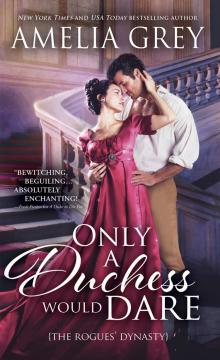 Only a Duchess Would Dare
Only a Duchess Would Dare The Earl Next Door
The Earl Next Door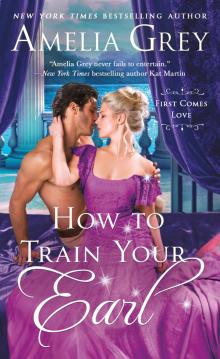 How to Train Your Earl
How to Train Your Earl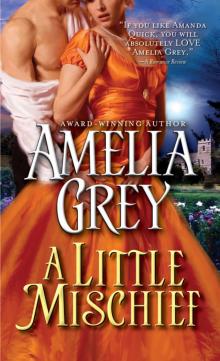 A Little Mischief
A Little Mischief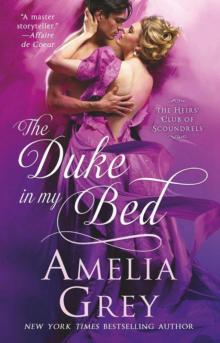 The Duke in My Bed
The Duke in My Bed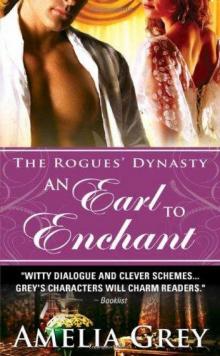 An Earl to Enchant: The Rogues' Dynasty
An Earl to Enchant: The Rogues' Dynasty A Dash of Scandal
A Dash of Scandal The Rogue Steals a Bride
The Rogue Steals a Bride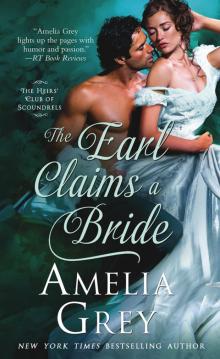 The Earl Claims a Bride
The Earl Claims a Bride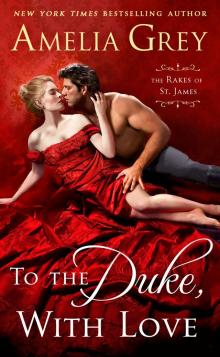 To the Duke, With Love
To the Duke, With Love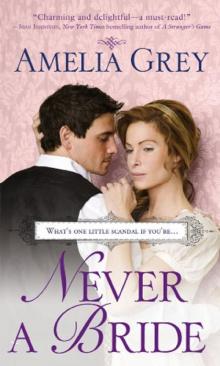 Never a Bride
Never a Bride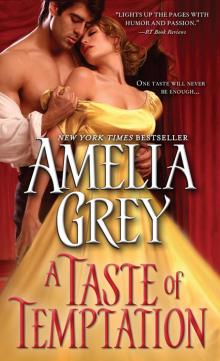 A Taste of Temptation
A Taste of Temptation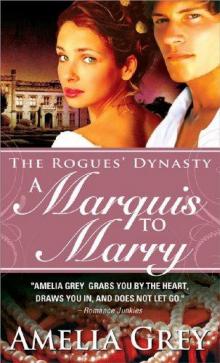 A Marquis to Marry
A Marquis to Marry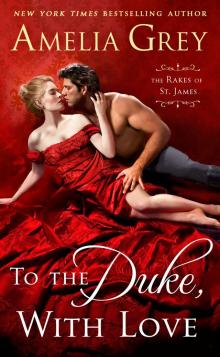 To the Duke, With Love--The Rakes of St. James
To the Duke, With Love--The Rakes of St. James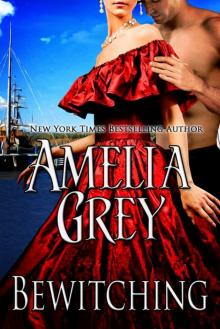 Bewitching
Bewitching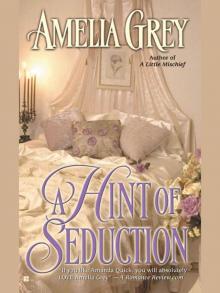 A Hint of Seduction
A Hint of Seduction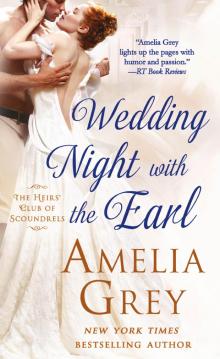 Wedding Night With the Earl
Wedding Night With the Earl Mistletoe, Mischief, and the Marquis (The Heirs' Club)
Mistletoe, Mischief, and the Marquis (The Heirs' Club)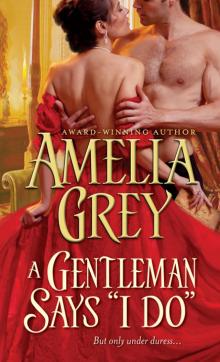 A Gentleman Says I Do
A Gentleman Says I Do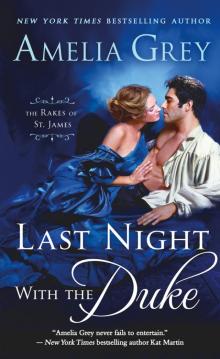 Last Night with the Duke
Last Night with the Duke A Duke to Die for: The Rogues' Dynasty
A Duke to Die for: The Rogues' Dynasty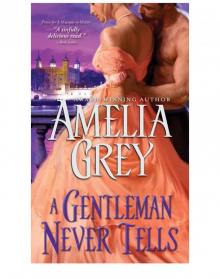 A Gentleman Never Tells
A Gentleman Never Tells The Duke and Miss Christmas
The Duke and Miss Christmas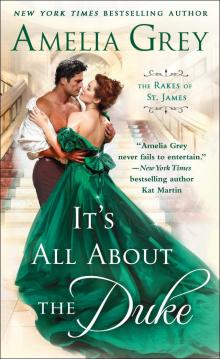 It's All About the Duke--The Rakes of St. James
It's All About the Duke--The Rakes of St. James